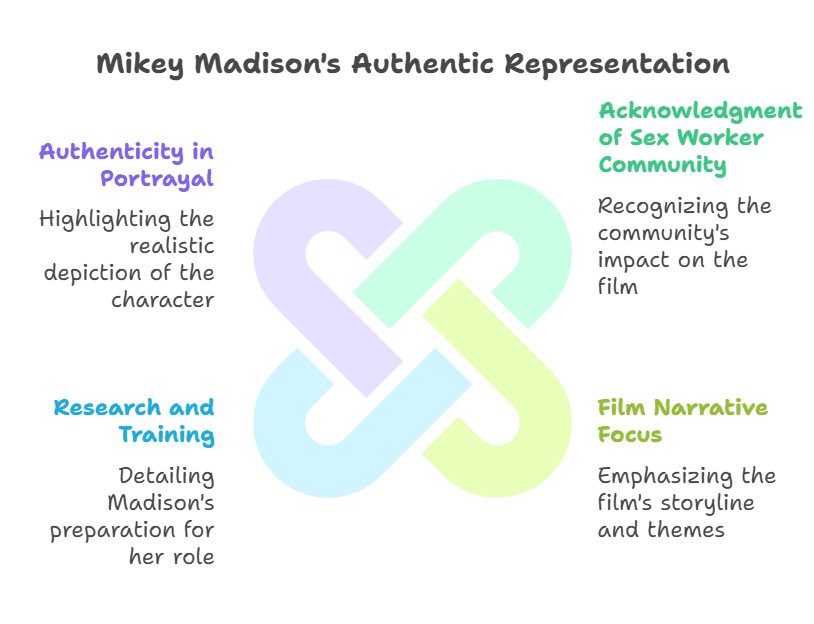“Anora,” directed by Sean Baker, has emerged as a significant cinematic achievement, blending critical acclaim with industry recognition. The film’s journey from conception to Oscar triumph is a testament to innovative storytelling, strategic marketing, and the evolving landscape of independent cinema.
Production and Development
The narrative of “Anora” centers on Ani, a young stripper from Brooklyn, whose impromptu marriage to Ivan, the son of a Russian oligarch, propels her into unforeseen challenges. Sean Baker drew inspiration from a friend’s account of a Russian-American newlywed’s abduction and his experiences editing Russian-American wedding videos in New York during 2000 and 2001. This foundation led to a script that intertwines personal anecdotes with broader societal themes.
Casting Mikey Madison as Ani was a pivotal decision. Baker, impressed by Madison’s performances in “Once Upon a Time in Hollywood” and “Scream,” offered her the role without an audition, tailoring the script to her strengths. Madison immersed herself in the character by learning Russian, visiting strip clubs, and mastering a Brooklyn accent, ensuring an authentic portrayal.
Filming commenced in early 2023 across various Brooklyn locations, including Brighton Beach, known for its Russian-speaking community. The production utilized Kodak Vision 5219 35 mm film to capture the city’s essence. Production designer Stephen Phelps, drawing from his background in experimental films, meticulously crafted sets that mirrored the film’s thematic depth, emphasizing muted tones with strategic bursts of red to symbolize underlying tragedy.
Critical Reception and Accolades
“Anora” premiered at the 77th Cannes Film Festival on May 21, 2024, receiving a ten-minute standing ovation and securing the prestigious Palme d’Or. Critics lauded the film for its sharp, poignant depiction of the American Dream’s complexities, with The Guardian naming it one of the best films of 2024 in the UK.
The film’s success continued during the awards season. At the 97th Academy Awards, “Anora” clinched five Oscars, including Best Picture, Best Director for Baker, Best Actress for Madison, Best Original Screenplay, and Best Film Editing. This accomplishment made Baker the second individual, after Walt Disney in 1954, to win four Oscars in a single night.
Box Office Performance and Distribution
Despite its critical acclaim, “Anora” faced modest box office returns, grossing approximately $41.6 million worldwide. This positions it among the lower-grossing Best Picture winners since 1990, alongside “Nomadland” ($39 million) and “CODA” ($3 million). However, both of these films had unique distribution circumstances, with “Nomadland” affected by the COVID-19 pandemic and “CODA” primarily released on Apple TV+.
Addressing box office concerns, Tom Quinn, CEO of Neon—the film’s North American distributor—highlighted the importance of digital platforms. He noted that “Anora” achieved the number one position across major entertainment platforms like Amazon and Apple, indicating a robust digital presence that complemented its theatrical run.
Director’s Advocacy for Theatrical Experience
During his Oscar acceptance speech, Sean Baker emphasized the significance of preserving the theatrical experience. He urged distributors to prioritize theatrical releases, expressing gratitude to Neon for their support. Baker also encouraged parents to introduce their children to movies in theaters, fostering a new generation of cinema enthusiasts.
Acknowledgment of the Sex Worker Community
In her acceptance speech for Best Actress, Mikey Madison took a moment to thank the sex worker community, reflecting the film’s narrative focus and her commitment to authentic representation. Madison’s portrayal of Ani was informed by extensive research and training, including attending a “stripper boot camp” to master pole dancing and twerking, ensuring an authentic depiction of her character’s profession.
Cultural Impact and Controversies
“Anora” has sparked discussions regarding Hollywood’s portrayal of sex workers. While the film presents Ani’s character with depth and affection, some within the sex worker community felt it didn’t fully represent their reality or advocate for necessary legal changes, such as decriminalization. This critique aligns with Hollywood’s historical trend of depicting sex workers, often awarding performances with Oscars, yet sometimes offering sanitized narratives that don’t fully capture the complexities of their experiences.
Additionally, the film’s success resonated internationally, notably in Russia. Russian state media celebrated “Anora’s” Oscar triumph, particularly highlighting Russian actor Yura Borisov’s nomination for Best Supporting Actor. However, this enthusiasm sparked controversy, especially in Ukraine, as it seemingly overlooked ongoing geopolitical conflicts, raising questions about cultural normalization amid political tensions.
“Anora’s” journey from a modestly budgeted independent film to an Oscar-winning phenomenon underscores the evolving dynamics of the film industry. It highlights the potential of strategic marketing, the growing significance of digital platforms, and the enduring importance of authentic storytelling. The film’s success serves as a testament to the power of independent cinema to challenge conventions, provoke discussions, and resonate with audiences worldwide.
The information is collected from Variety and Yahoo.






































